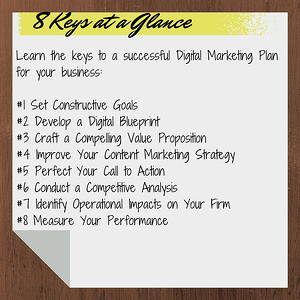
When it comes to crafting a comprehensive digital marketing plan, strategic planning is no less important. Although every firm is different, yours can benefit from these eight keys to success.
1. Set Constructive Goals for Your Business
A decade ago, it might have been enough just to have a website with your company's name and logo on it. That's not enough anymore. It's critical to accompany the development of your website with a set of clear, quantitative goals for attracting visitors, converting them to leads and nurturing them until they are sales ready to be closed as customers.
2. Develop a Digital Blueprint
Before you start implementing your marketing goals, you'll need a blueprint designed to take you from start to finish. The design of this blueprint will depend on the nature of your business goals and the challenges and the needs of your ideal target audience or persona. As with any blueprint, it includes several critical components that need to be effectively identified and implemented to position your company as the competitive digital force in your industry.
3. Craft a Compelling Value Proposition
You have just a few seconds online to communicate why your ideal target audience should do business with you.
Everyone says their products are great.
Everyone says their service is outstanding.
No one believes that.
You need a credible compelling value proposition to keep them interested.
4. Improve Your Content Marketing Strategy
Content marketing is the key component of a successful digital marketing plan.
After developing your company's buyer personas, identify the information they need the most to help them through the buying cycle stages of Interest, Consideration and Decision.
You need to identify the types and delivery modes of content that will compel them to engage with your company through each stage in order to become a customer.
5. Perfect Your Call to Action
You can't sell if you don't close.
To complement your content portfolio and reinforce your value proposition, create a call to action (CTA) that compels your website visitors to convert.
Ensure that it sticks by incorporating it into your website's design and landing pages.
Make sure you follow up with a Thank-You Page or tangible offer (i.e. free consultation, downloadable white paper, etc.)
6. Conduct a Competitive Analysis
Understanding your competitive marketplace is vital to knowing how to position yourself in comparison with your competitors.
Therefore, conduct a competitive analysis that measures your market as well as your company’s relative strengths and weaknesses as compared to your competitors.
You might even find some competitors you didn't know you had.
7. Identify Operational Impacts on Your Firm
Determine how your digital outreach strategy will impact the workload and performance of each of your firm's departments.
The best strategies seamlessly incorporate sales, business development, product and service delivery, and support to maximize conversions and Return-on-Investment (ROI).
8. Measure Your Performance
As they always say, you can't manage what you don't measure.
With a bevy of digital analytic tools at your fingertips, it's possible to assess the performance of every piece of your marketing plan.
If you can remain disciplined, you'll be able to determine over time what's working and what's not. It’s best to use a platform that pulls all of your performance activity together.
Tying It All Together
If this all seems a bit overwhelming, you're not alone. Every business is different, and the manner in which you employ these tips will be unique to your company's needs.
That said, one thing is clear: In an increasingly crowded online landscape, a comprehensive digital marketing plan will help your company stand out.
Get more details about each of the key steps listed above by downloading the Free Marketing Plan “8 Critical Elements of a Digital Marketing Plan.”
